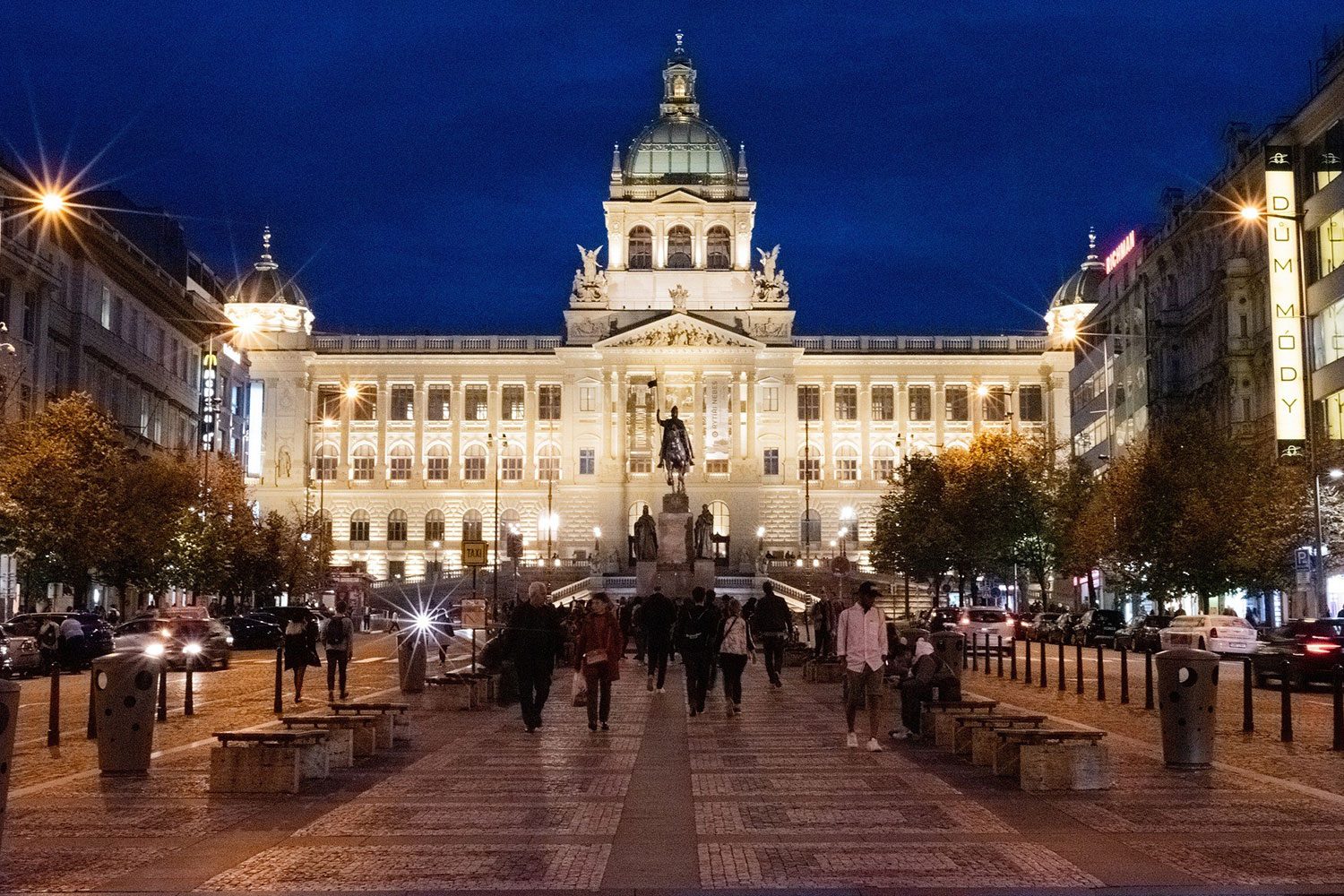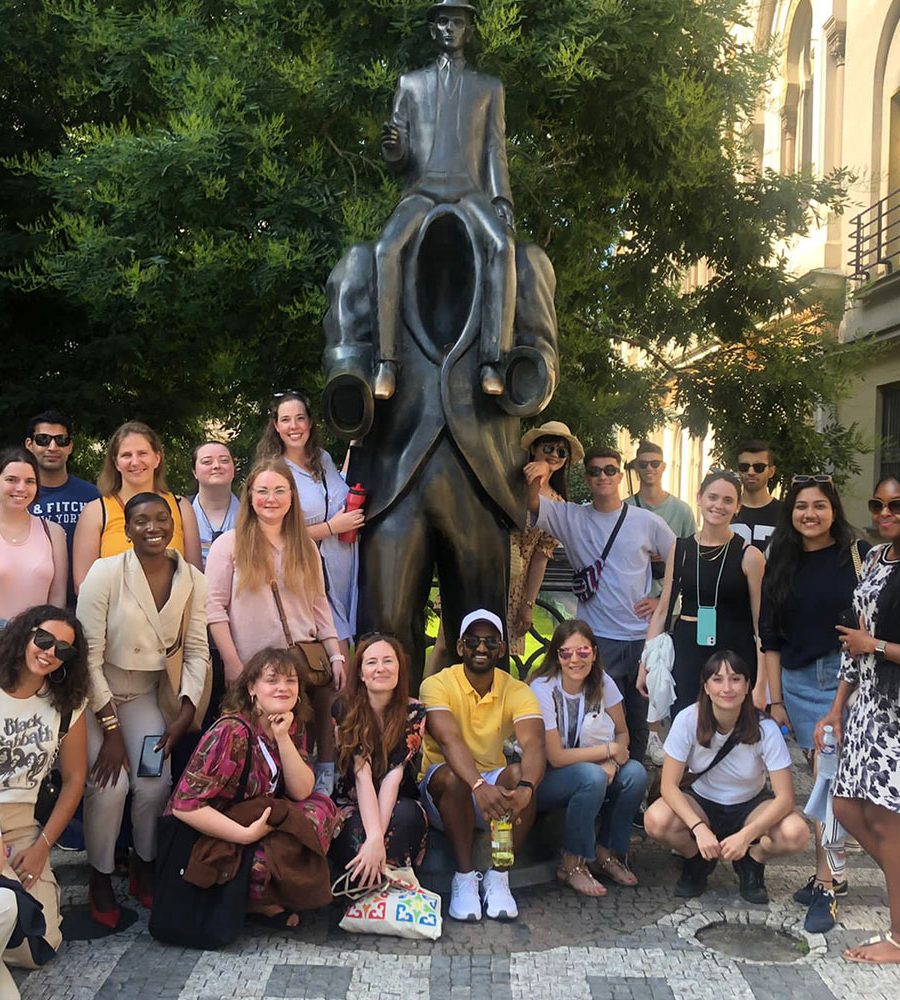
June 29th - July 6th, 2024
Behavioral Economics & Psychology
The Summer School on Behavioral Economics and Psychology enriches students from diverse backgrounds with state-of-art research on behavioural aspects of decision-making and experimental psychology. Grab a unique opportunity to learn about the implications of behavioral research for policy making and creation of public institutional settings as well as its practical application for the realm of organizational management and helping us to cope with flood of information in the current world.
About Program
The program provides students with a unique opportunity to better understand the role of emotions in our “rational” decision-making and to learn about the implications of behavioral research for policy making, its practical applications in the realm of organizational management and how we can use the behavior insights at the individual level.
The program aims to invite students of different backgrounds and experiences, who are eager to discover behavioral psychology and willing to combine a challenging academic environment with the holiday excitement.
Topics:
- How emotions impact “rational” decision-making.
- How to stay honest under any circumstances.
- Why do people perceive specific behaviors as fair today, yet an almost identical behavior may cause a lynch tomorrow?
- How to make your employer love you from day one.
- Why should you read newspapers you don’t like.
- Why your Google account makes you dumber.
*Please be aware that the course content is subject to possible revisions. While we have outlined the current topics and modules, there may be adjustments or updates throughout the duration of the course to ensure that we provide you with the most relevant and up-to-date information.
Insights obtained from behavioral economics research can be used to design new institutional settings that will help people avoid negative consequences of their systematic errors in decision making, yet maintain the possibility of freedom of choice for those who wish to diverge from the default. This “libertarian paternalistic” approach provides one of the most interesting and practical frameworks for creating incentive structures not only in public policy sphere, but also in management and marketing.
The aim of the program is therefore to provide students with a unique opportunity to gain or deepen their knowledge of decision-making and its errors, and behavioral economics implications for policy making and public institutional settings, as well as its practical implications for the realm of organizational management. In order to better understand scientific methods used in research, the participants will design their own experiments under the supervision of the lecturers, conduct them, and present their results to the other participants, who subject them to critical discussions.
The knowledge and analytical skills, which the students shall acquire, can be utilized in the areas of policymaking, management, marketing and advertising, consulting, as well as media.
The Sumer School classes will focus on:
Dual system of decision-making – are we emotional or rational driven
People do not make decisions based solely on rational analyses as this would be ineffective and non-optimal in a world of limited resources and time constraints. Moreover, as Damasio has showed, in the absence of emotions, cold rational reasoning can lead to worse outcomes than decision influenced by fear, anger or other affective states. Therefore dual system of decision-making seems to be a more efficient way to integrate emotions with rational deliberation. While this dual system serves us well in many everyday situations, it can also lead to errors. The current research helps us understand these systematic errors, predict them and even avoid them.
Dishonesty of honest people – bastards within nice people
From the point of view of traditional economic theories, decisions to violate law or act dishonestly are motivated solely by a cost-benefit analysis: what can I get by criminal or immoral behavior and what negative consequences I risk (in the case I got caught). Behavioral economics expands this view substantially: based on many psychological studies, it seems obvious that dishonest behavior is influenced by a range of many other subtle factors, from motivation to have a positive self-image, saliency of social and formal norms, to emotional states experienced in the moment of decision making. We will also discuss how to use all this knowledge in order to make people more honest in a workplace and in everyday situations.
Fairness – killing the killer
Yet another departure from traditional rational model of human being has been developed by reconsidering views on fairness in our decision-making. A certain behavior, although being rational and benefiting all concerned, is rejected by those involved as repulsive and not acceptable. Is cutting wages during the economic downturn fairer than laying people off? Can you sell the last bottle of water you brought to the Sahara desert for more than the earlier one without being lynched? Similar questions posed in classes on economics might have simple answers, however when you ask general public, you might be surprised for getting rather different answers. The course will discuss and analyze the role of fairness in human decision-making as well as valuation of these decisions by others.
Sources of the information – hoaxes or reliable information
Biases identified by behavioral research prove to have wide applications in everyday life. In general, people use the mass media as a crucial source of information and believe in unbiasedness of media, but it is not always the case. For example, some media supply rather leftist while the other stick to the rightest news.
In the same time, media supply great amount of data thanks to which we are able to study the biases of “old media” as well as new social media such as Facebook. The course answers questions of why you should read newspapers you don’t like, why your Google account makes you dumber or how to take advantage of information provided by new media.
Behavioral errors in organizations – being a very happy employee (or employer)
We will present an overview of empirical evidence from the behavioral organizational economics which will extend standard model of worker’s behavior. We will emphasize four stylized extensions: the worker’s reference dependent decision-making, influence of reciprocity between an employer and an employee (gift-exchange theory), importance of extrinsic and intrinsic motivation (and possible crowding-out effect), and the impact of relative performance compensation on the cooperation, reciprocity and sabotage in firms. The course will also address main (mis)behavioral regularities in managers’ decision-making, mostly on their over-optimism, leadership styles and corporate culture.
Experiment
The most effective way of learning is experience. Employing knowledge and tools provided during the lectures students will be required to conduct their own experiment and present its results before their colleagues. Students will be welcome to come up with their own creative ideas and solutions in experiment proposals and will be supported in the actual practical realization of experiments. In addition to utilization of their existing knowledge students will gain understanding of practical problems and limitations of experimental design.
Day 1
- 12.00 – 18.00 Registration
- 19.00 – 19.30 Orientation / Ice Breaking Session
- 20.00 Welcome Dinner
Day 2
- 09.30 – 10.00 Introduction
- 10.00 – 11.15 Lecture 1
- 11.15 – 11.30 Coffee Break
- 11.30 – 12.45 Lecture 2
- 13.00 Lunch
- 15.00 Tours of Prague
Day 3
- 09.30 – 10.45 Lecture 3
- 10.45 – 11.00 Coffee Break
- 11.00 – 12.15 Lecture 4
- 12.15 Lunch
- 16.00 Pragulic Tour
Day 4
- 09.30 – 10.45 Lecture 5
- 10.45 – 11.00 Coffee Break
- 11.00 – 12.15 Lecture 6
- 12.15 Lunch
- 14.00 – 15.15 Lecture 7
- 15.15 – 15.30 Coffee Break
- 15.30 – 16.45 Lecture 8
- 19.00 Happy Hour
Day 5
- 10.00 Free Day (Choose from 4 whole-day trips)
- 19.00 Dinner
- 21.00 Boat Tour
Day 6
- 09.30 – 10.45 Lecture 9
- 10.45 – 11.00 Coffee Break
- 11.00 – 12.15 Lecture 10
- 12.15 Lunch
- 14.00 – 15.15 Leccture 11
- 15.15 – 15.30 Coffee Break
- 15.30 – 16.45 Lecture 12
- 17.00 Guest Lecture
Day 7
- 09.30 – 10.45 Lecture 13
- 10.45 – 11.00 Coffee Break
- 11.00 – 12.15 Lecture 14
- 12.15 Free Time
- 18.00 FAREWELL PARTY
Day 8
- Departure
- Earlybird application deadline – February 10th
- Final Application deadline – May 1st
- All students will be informed about the admission decision by May 31st
- If accepted, program fee must be paid within 14 days after receiving acceptance letter
- Day 1 (29. 6. 2024) Registration day (12 p.m. – 6 p.m.)
- Day 7 (5. 7. 2024) End of program and Farewell party
- Day 8 (6. 7. 2024) – Departure
🎯 Objectives
Insights obtained from behavioral economics research can be used to design new institutional settings that will help people avoid negative consequences of their systematic errors in decision making, yet maintain the possibility of freedom of choice for those who wish to diverge from the default. This “libertarian paternalistic” approach provides one of the most interesting and practical frameworks for creating incentive structures not only in public policy sphere, but also in management and marketing.
The aim of the program is therefore to provide students with a unique opportunity to gain or deepen their knowledge of decision-making and its errors, and behavioral economics implications for policy making and public institutional settings, as well as its practical implications for the realm of organizational management. In order to better understand scientific methods used in research, the participants will design their own experiments under the supervision of the lecturers, conduct them, and present their results to the other participants, who subject them to critical discussions.
The knowledge and analytical skills, which the students shall acquire, can be utilized in the areas of policymaking, management, marketing and advertising, consulting, as well as media.
🗒 Program Outline
The Sumer School classes will focus on:
Dual system of decision-making – are we emotional or rational driven
People do not make decisions based solely on rational analyses as this would be ineffective and non-optimal in a world of limited resources and time constraints. Moreover, as Damasio has showed, in the absence of emotions, cold rational reasoning can lead to worse outcomes than decision influenced by fear, anger or other affective states. Therefore dual system of decision-making seems to be a more efficient way to integrate emotions with rational deliberation. While this dual system serves us well in many everyday situations, it can also lead to errors. The current research helps us understand these systematic errors, predict them and even avoid them.
Dishonesty of honest people – bastards within nice people
From the point of view of traditional economic theories, decisions to violate law or act dishonestly are motivated solely by a cost-benefit analysis: what can I get by criminal or immoral behavior and what negative consequences I risk (in the case I got caught). Behavioral economics expands this view substantially: based on many psychological studies, it seems obvious that dishonest behavior is influenced by a range of many other subtle factors, from motivation to have a positive self-image, saliency of social and formal norms, to emotional states experienced in the moment of decision making. We will also discuss how to use all this knowledge in order to make people more honest in a workplace and in everyday situations.
Fairness – killing the killer
Yet another departure from traditional rational model of human being has been developed by reconsidering views on fairness in our decision-making. A certain behavior, although being rational and benefiting all concerned, is rejected by those involved as repulsive and not acceptable. Is cutting wages during the economic downturn fairer than laying people off? Can you sell the last bottle of water you brought to the Sahara desert for more than the earlier one without being lynched? Similar questions posed in classes on economics might have simple answers, however when you ask general public, you might be surprised for getting rather different answers. The course will discuss and analyze the role of fairness in human decision-making as well as valuation of these decisions by others.
Sources of the information – hoaxes or reliable information
Biases identified by behavioral research prove to have wide applications in everyday life. In general, people use the mass media as a crucial source of information and believe in unbiasedness of media, but it is not always the case. For example, some media supply rather leftist while the other stick to the rightest news.
In the same time, media supply great amount of data thanks to which we are able to study the biases of “old media” as well as new social media such as Facebook. The course answers questions of why you should read newspapers you don’t like, why your Google account makes you dumber or how to take advantage of information provided by new media.
Behavioral errors in organizations – being a very happy employee (or employer)
We will present an overview of empirical evidence from the behavioral organizational economics which will extend standard model of worker’s behavior. We will emphasize four stylized extensions: the worker’s reference dependent decision-making, influence of reciprocity between an employer and an employee (gift-exchange theory), importance of extrinsic and intrinsic motivation (and possible crowding-out effect), and the impact of relative performance compensation on the cooperation, reciprocity and sabotage in firms. The course will also address main (mis)behavioral regularities in managers’ decision-making, mostly on their over-optimism, leadership styles and corporate culture.
Experiment
The most effective way of learning is experience. Employing knowledge and tools provided during the lectures students will be required to conduct their own experiment and present its results before their colleagues. Students will be welcome to come up with their own creative ideas and solutions in experiment proposals and will be supported in the actual practical realization of experiments. In addition to utilization of their existing knowledge students will gain understanding of practical problems and limitations of experimental design.
🕒 Schedule
Day 1
- 12.00 – 18.00 Registration
- 19.00 – 19.30 Orientation / Ice Breaking Session
- 20.00 Welcome Dinner
Day 2
- 09.30 – 10.00 Introduction
- 10.00 – 11.15 Lecture 1
- 11.15 – 11.30 Coffee Break
- 11.30 – 12.45 Lecture 2
- 13.00 Lunch
- 15.00 Tours of Prague
Day 3
- 09.30 – 10.45 Lecture 3
- 10.45 – 11.00 Coffee Break
- 11.00 – 12.15 Lecture 4
- 12.15 Lunch
- 16.00 Pragulic Tour
Day 4
- 09.30 – 10.45 Lecture 5
- 10.45 – 11.00 Coffee Break
- 11.00 – 12.15 Lecture 6
- 12.15 Lunch
- 14.00 – 15.15 Lecture 7
- 15.15 – 15.30 Coffee Break
- 15.30 – 16.45 Lecture 8
- 19.00 Happy Hour
Day 5
- 10.00 Free Day (Choose from 4 whole-day trips)
- 19.00 Dinner
- 21.00 Boat Tour
Day 6
- 09.30 – 10.45 Lecture 9
- 10.45 – 11.00 Coffee Break
- 11.00 – 12.15 Lecture 10
- 12.15 Lunch
- 14.00 – 15.15 Leccture 11
- 15.15 – 15.30 Coffee Break
- 15.30 – 16.45 Lecture 12
- 17.00 Guest Lecture
Day 7
- 09.30 – 10.45 Lecture 13
- 10.45 – 11.00 Coffee Break
- 11.00 – 12.15 Lecture 14
- 12.15 Free Time
- 18.00 FAREWELL PARTY
Day 8
- Departure
📅 Important dates
- Earlybird application deadline – February 10th
- Final Application deadline – May 1st
- All students will be informed about the admission decision by May 31st
- If accepted, program fee must be paid within 14 days after receiving acceptance letter
- Day 1 (29. 6. 2024) Registration day (12 p.m. – 6 p.m.)
- Day 7 (5. 7. 2024) End of program and Farewell party
- Day 8 (6. 7. 2024) – Departure
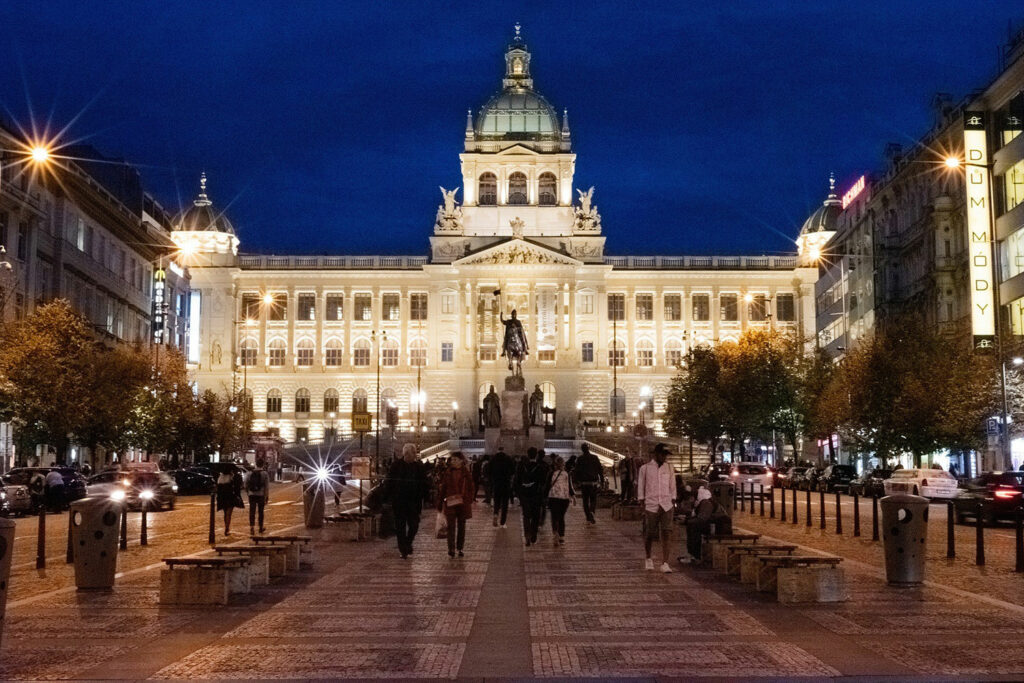
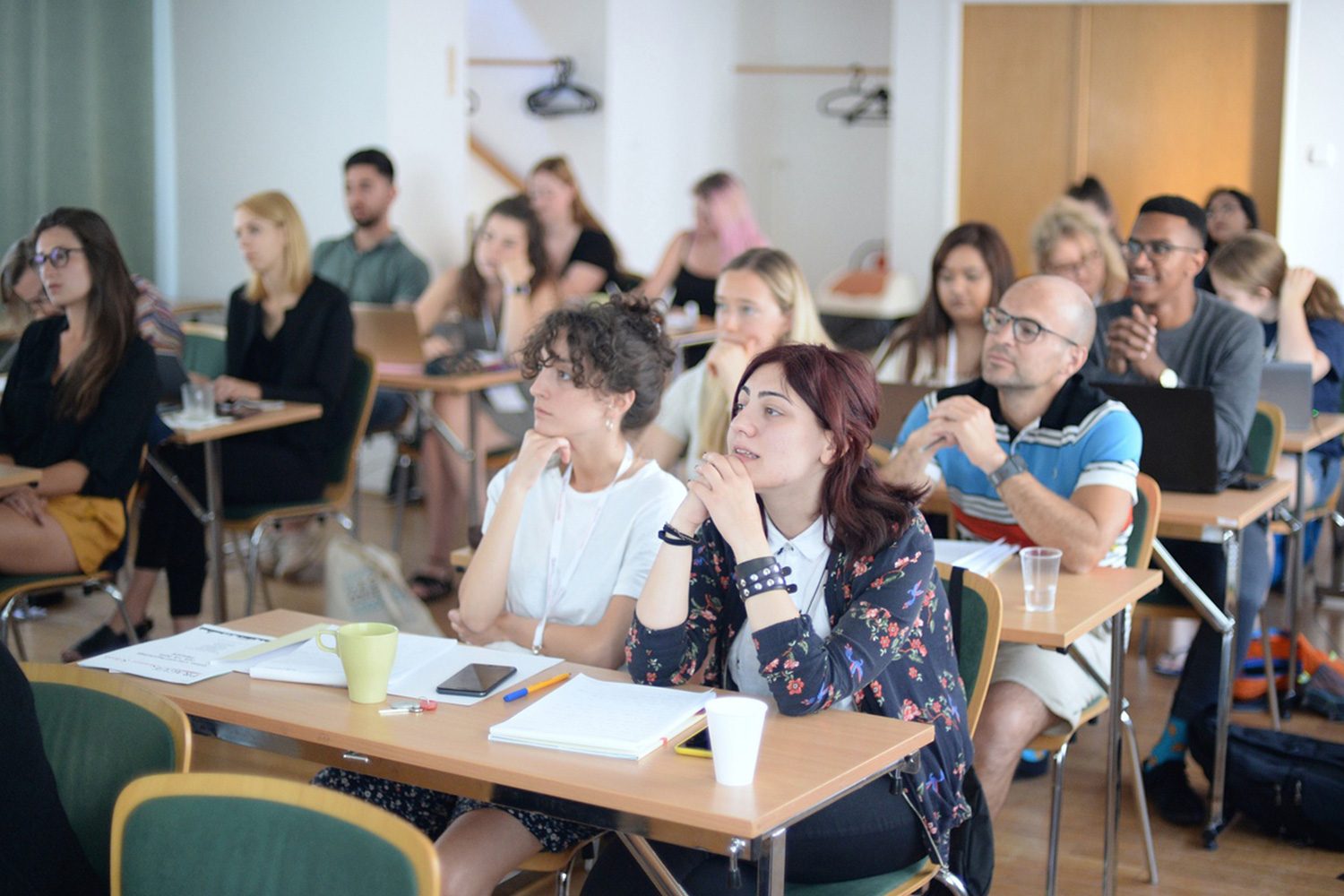
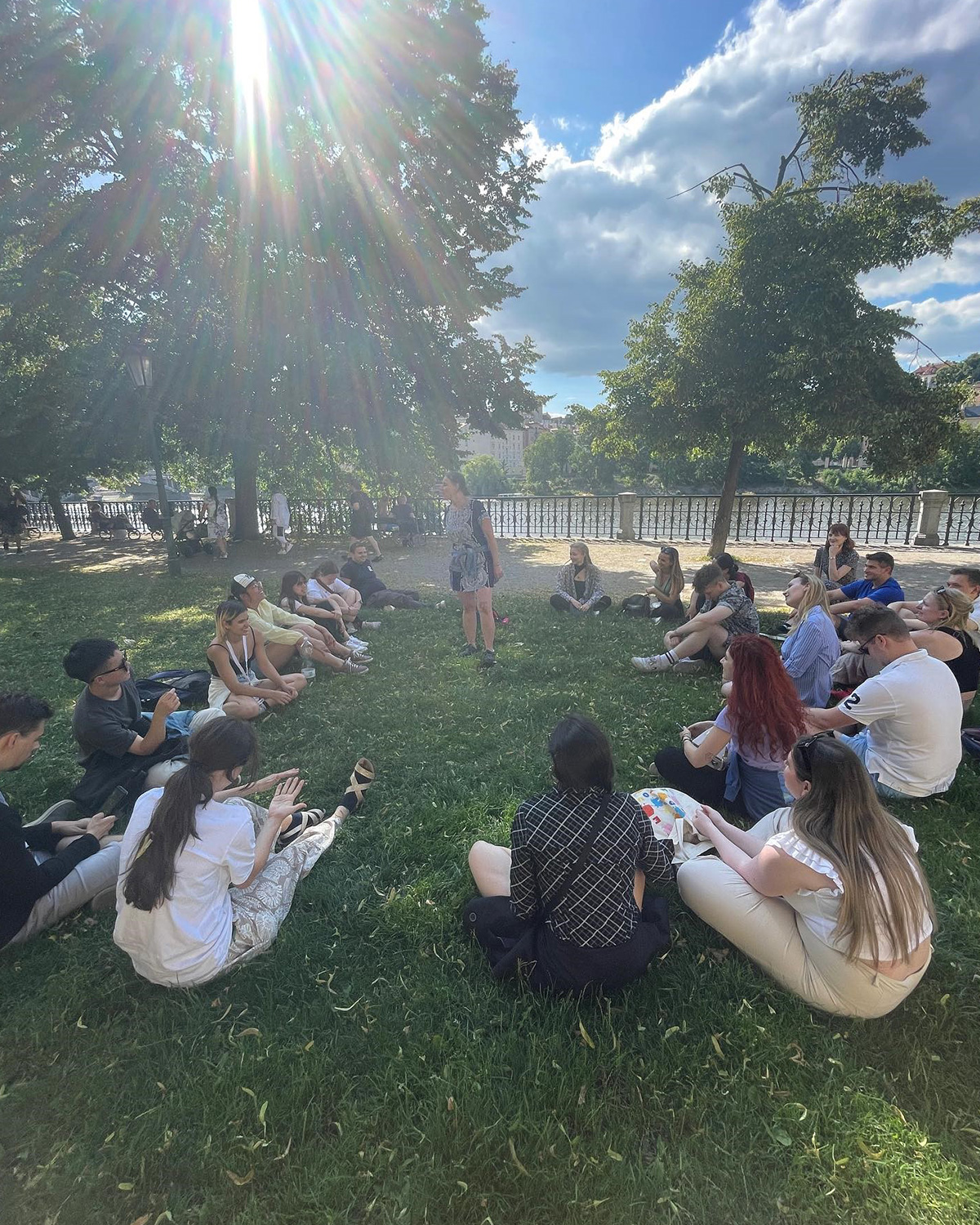
IMPROVE
Academic Foundations
EXPAND
Your Horizons
EXPERIENCE
Academic Study and Fun
Summer School on Behavioral Economics & Psychology
Enhance Your Learning Experience With These Lecturers

Joshua Hayden Ed.D.
See Joshua's BIO
Joshua M. Hayden, Ed.D. is Chair of Department of Social Sciences in the school of Humanities and Social Sciences and lecturer in Leadership Studies at Anglo-American University in Prague, Czechia. Joshua Hayden earned his doctorate in higher education leadership and policy from Vanderbilt University in the U.S. and has published and taught in the field of leadership studies for the past ten years. He i experienced in corporate, nonprofit, and public sector leadership consulting and training, and has worked with community, educational, and organizational leaders in Haiti, India, Kazakhstan, Ethiopia, Uganda, and Brazil His research interests are moral psychology, Václav Havel and Charter 77, leadership ethics and change, and decision making. Most recently his academic work has focused on spiritual leadership and the ethics of hope as well as the role of trust among leaders and followers.

doc. Ing. Helena Chytilová, Ph.D., M.A.
See Helena's BIO
Helena Chytilová graduated in 2018 at the University of Economics in Prague. She received her Ph.D. in Economics from the same institution in 2013. She is currently working at the Department of Economics at the Faculty of Economics, VŠE. She has completed study and research fellowships at the University of Houston, Texas (2010), Vienna Center for Experimental Economics, University of Vienna (2013) and University of Chicago, Becker Friedman Institute (2014) and a fellowship at Staffordshire University and Universiteit Antwerp (2006). She specializes in experimental economics, behavioral macroeconomics and economics of education.

Mgr. Robin Kopecký
See Robin's BIO
Robin Kopecky is a cognitive science researcher at the Czech Academy of Sciences, and also conducts research at the Academy of Arts, Architecture and Design in Prague, focusing on how design affects human behavior. Trained in both philosophy and biology, he has published research papers on human moral behavior in various psychological and philosophical journals. Moreover, Robin works as a lecturer of experimental philosophy and logic at Charles University in Prague.

Marek Davis
See Marek's BIO
Mark Davis is involved in research at Missouri State University, where he is both a student and a researcher. He has been involved in several research projects, such as being an assistant scientist at S.O.C.I.A.L. Norm’s Psychology Lab and research in behavioural economics. He is dedicated to teaching undergraduate students and focuses on individual tutoring support for students on Psychology topics. He is interested in behavioural psychology and economics, particularly promoting behavioural games and nudging.

